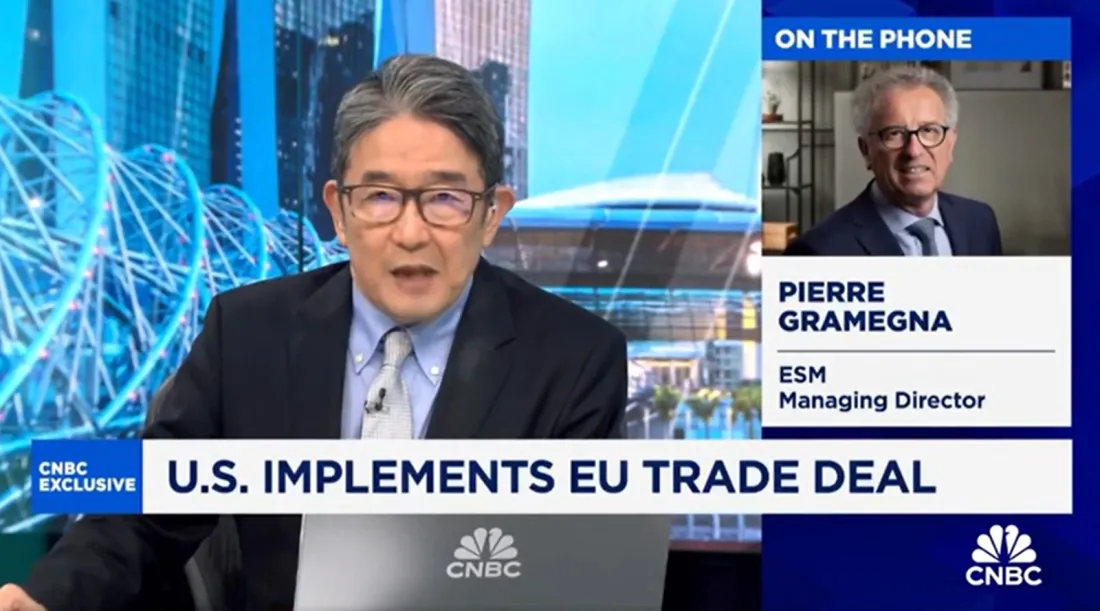Pierre Gramegna in interview with CNBC Squawk Box Asia

Transcript of interview with ESM Managing Director Pierre Gramegna
CNBC Squawk Box Asia
Interviewer: Martin Soong
25 September 2025
CNBC: We just quoted you saying that the US-EU Trade Agreement is good. It removes some uncertainty, but the risks remain in terms of implementation. Would you say that it means that the need for the ESM today is greater than ever because of this?
Pierre Gramegna: Good morning. It's a pleasure to be with you. I think we have to recognise that the European Commission was right in pushing for an agreement. We see the benefits of that because we have avoided far higher tariffs. You could say we have avoided a trade war, and now we have certainty of a rate of 15% for many products, to say it in a simple manner. Now, implementation with the US administration is sometimes difficult, but at the same time, companies enjoy this certainty and can plan. The ESM is interested in everything that spurs growth, in everything that ensures predictability, so having an agreement is a great advantage. You just had a discussion with India prior to this programme, and you see that having uncertainty is the greatest risk, and so we have avoided it. That's good news for the European Stability Mechanism.
I wanted to ask you about that next step here, the threat from the US tariffs on EU economies and companies. How high is that? How would you rank or rate it compared to the risk and threat from China in terms of flooding EU markets with cheaper and cheaper products? What could that mean for EU producers? Consumers are going to love it, obviously. European companies may not.
There is some worry about that. If you look at the latest figures in the last month, this tendency has not been proven, has not been there. But let's face it, having the pressure of the additional tariffs and having the competition from China is going to be quite a challenge for European companies. But, on the other hand, challenges are there to be taken into account and will encourage companies to be more productive. It has been one of the weaknesses of Europe, a lack of productivity in the last years. I think we have to face it now, and I'm confident this is possible. If I look at the growth rates that we expect this year, around 1%, that shows a lot of resilience. We also have an outlook of 1.2% to 1.5% for next year. I think that the scenarios that we are seeing now are more optimistic than we expected back in April.
One of the things that people everywhere are looking at as a way to improve productivity is by adding AI, artificial intelligence. Europe, I think it would be fair to say, has not been very conspicuous in terms of leading the AI chart. Does that concern you? Is it not being done? Should more be done, and what?
This is being recognised. You are completely right. This is something that we have to work on. The difficulty in Europe is many topics are in the national competence. In fact, what you're talking about, AI, is on the side of the private economy. Maybe we should look into having public-private partnerships on this or making sure we have the necessary means because the investments to be competitive in AI are quite high. On the other hand, for example, in supercomputing, in quantum computing, Europe is very well placed. So, I would not generalise this topic.
As head of the ESM and also given your background in finance at ministerial level, how would you rate EU finances right now, geography by geography? A lot of it also has to do with what's happening over in Russia. There's been a lot of spending going on. The fiscal taps are going full bore, maybe belatedly, but at least finally, how are European finances holding up?
Well, I would say that they're holding up well. In fact, the total debt compared to GDP has gone down since the Covid years. Second, we have a new Stability and Growth Pact, which means that we have a stable framework against which we measure if countries comply with the benchmarks. The good news is they do comply with the benchmarks, and it shows that having rules and a framework is an advantage for countries, and they can design a path to comply with the new rules. It’s something that, in fact, other areas of the world don't have. I think we have discipline, and we are applying it, and honestly, I am confident that the new rules will allow for the necessary flexibility without compromising financial stability. Having common rules for Europe on fiscal balances is really an advantage, and I think for the time being, it is really delivering.
That's on the fiscal side, and on the monetary side, a lot of folks think the ECB is pretty much done cutting rates. Do you think they are? I mean, this is a sensitive question. Do you think they are done cutting rates, or do you think they need to or should be cutting further?
I think the European Central Bank has found a good balance here. Now, inflation is at target at 2% and interest rates are at 2% - this is a magic situation that happens very rarely. But more importantly, what you can see is that there's been a lot of attention and attraction towards the euro. In the last months, the international role of the euro has been much more in the forefront. We have also seen this on the markets as European Stability Mechanism. We are very active on the markets as we issue bonds; the interest of investors towards euro-denominated bonds is increasing a lot. There is a lot of trust in the euro area, and I think this is good news. Also, there is some questioning on the role of the dollar as a safe-haven. I think this is an opportunity that Europe must seize, that we, as ESM, are advocating, and the European Central Bank is advocating. I think there's a lot of interest in that direction.
One of the reasons why you're joining us on the phone from Tokyo is that you’re on a roadshow. You're talking to a lot of people about a digital euro, euro-backed stablecoins as well. How are those conversations going?
This discussion about the digital euro is on our minds in every meeting in the Eurogroup that I attend. We have recognised the urgency for us as Europeans to develop this digital currency because it would help us to have faster payments, more reliable ones, less expensive ones, and it really corresponds with the needs of consumers. So this project is going ahead and it has the full support of the European Stability Mechanism.
Author

Contacts


